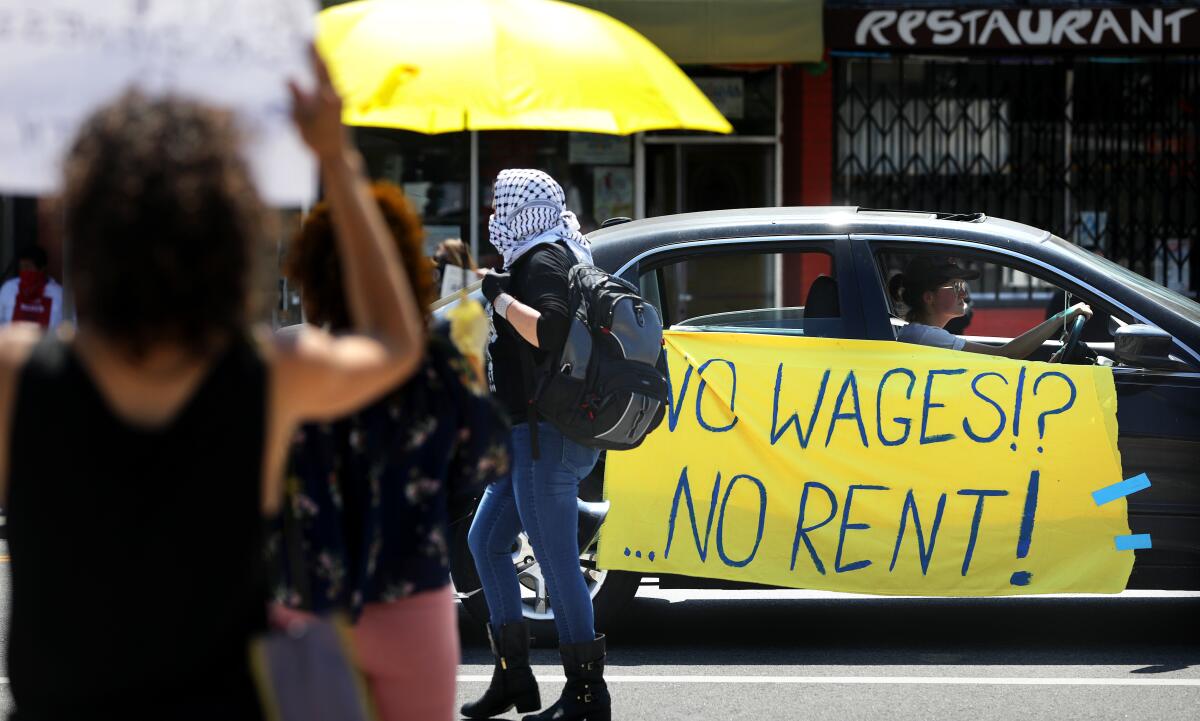Editorial: Seven steps California can take to prevent a coronavirus housing and homelessness disaster

- Share via
If you thought California had a housing and homelessness crisis before COVID-19, just wait. The pandemic could make it all so much worse.
The unemployment rate hit nearly 15% in April, the highest it’s been since World War II, and some 23 million Americans are out of work. Low-income households have been particularly hard hit, with 40% of job losses among workers who earn less than $40,000 a year. These are people who struggled to cover their housing expenses and other monthly bills before the pandemic. It’s no wonder experts are warning that California could see a 20% increase in homelessness, with the surge even more severe in other parts of the country. If the downturn drags on, we could see more evictions and foreclosures than the Great Recession triggered.
It’s a make-or-break moment. With swift, determined action, we could ward off the worst outcomes, avoid mass evictions, save people from falling into homelessness, avert devastating foreclosures and prevent a real estate collapse.
Study after study has demonstrated that affordable, stable, safe housing is the key to well-being and upward mobility. Without housing, it’s hard to get a job, let alone perform well enough to hold onto it. Without a stable home, kids struggle to perform well in school.
Keeping people housed is important for the U.S. economy, too. Federal Reserve Chairman Jerome Powell has repeatedly told Congress that the best way to avoid a long, painful recession is to spend, spend, spend to help families stay solvent and to “keep workers in their homes, keep them paying their bills.”
We spoke to experts about what new policies and programs could help prevent the next housing crisis and ease the housing shortage that existed long before COVID-19. These aren’t the only ideas, by far. Rather, they make up a selection of pragmatic proposals that could be embraced right now.
Help tenants pay their rent
The easiest and fastest — and yes, most expensive — way to prevent a housing crisis is for the federal government (and federal taxpayers) to put up the money to keep renters in their homes and landlords whole.
Because Congress, state and local governments have imposed a patchwork of eviction moratoriums, many tenants who can’t pay the rent won’t lose their home during the pandemic. But they’ll eventually have to come up with the payments they missed. When the debt comes due, there could be a wave of evictions. In the meantime, landlords still have to pay their bills, including their mortgages, property taxes, insurance and maintenance. And the investors who bought mortgage securities, including pension funds and insurance companies, are relying on those payments as well.
Tenants’ inability to pay their rent could set off a devastating chain reaction in the real estate and finance industries that could have lasting effects on the economy. It makes sense for lawmakers to do everything possible to prevent that pain.
Earlier this month Democratic members of Congress proposed a $100-billion emergency rental assistance fund for low-income tenants. House Democrats incorporated that fund into the $3-trillion relief bill they passed last week on a near-party-line vote; the measure also would delay mortgage payments for up to a year for owners of one- to four-unit dwellings who have pandemic-related issues and would create a $75-billion homeowners’ assistance fund to help with mortgages, utility bills and property taxes. The bill is going nowhere in the Senate at the moment; Republican leaders have said it’s too expensive and there’s no need to act yet.
We’ve seen what can happen when lawmakers don’t respond adequately to a housing catastrophe. There are families and communities today that still have not recovered from the Great Recession. Congress and the Trump administration can pay now and forestall serious consequences. Or they can pay later, when the price to ease the human suffering and the economic toll will be much greater.
Help the Los Angeles Times reimagine what California should look like after the COVID-19 pandemic ends.
Help landlords cover their losses
Even if the federal government enacts a rental assistance program, it almost certainly won’t cover all distressed renters. There will still be tenants who can’t pay their rent and will face eviction, and landlords who will lose money. A group of California lawmakers have a promising new idea to encourage landlords and tenants to make a deal.
Under this proposal, landlords who agree to forgive rent payments and not evict tenants would get tax credits equal to the value of the lost rent. The tax credits would be transferable so the property owner could sell them to get cash immediately. The program would be available only to tenants who have a financial hardship because of COVID-19, and the tenants would have to repay their rent debt to the state over 10 years, starting in 2024.
Help small landlords
Most landlords are small-business owners, and most rental properties, particularly in California, are buildings with 10 or fewer apartments. If a few tenants can’t pay the rent, that’s a serious financial hit. Landlords could lose their properties to foreclosure or could be prompted to sell. Both scenarios could accelerate the shift from mom-and-pop landlords to investment firms that buy up distressed properties, evict the tenants, remodel the units and jack up the rents. Los Angeles and other cities are looking to create relief funds to help mom-and-pop landlords pay their bills and stay in business.
Buy hotels and motels
California cities and counties are already renting hotel rooms during the pandemic for homeless people who are 65 and older or have an underlying medical condition. Now Gov. Gavin Newsom wants to use $750 million in federal relief dollars to buy some of those hotels and motels and turn them into permanent homeless housing. This isn’t a new idea. Local governments have been trying to buy up motels to held get people off the streets, but often the property owners were unwilling sellers. The post-pandemic economic outlook and ready cash from the government might change their minds. There’s also discussion among philanthropic groups about creating investment funds to help nonprofit groups buy distressed properties to convert into affordable housing.
Put up tiny houses or trailers
This is another old idea that started to gain steam earlier this year. In January, Newsom began sending dozens of camping trailers to communities for temporary homeless housing. Los Angeles city and county partnered to put the trailers on publicly owned parking lots, creating transitional communities where homeless families could stay and get services while looking for permanent housing. After COVID-19 hit the state, Newsom moved to buy more than 1,300 additional trailers to provide homeless individuals a place to quarantine themselves safely. The pandemic showed it’s possible to find and quickly install temporary housing to get people off the streets. Going forward, there’s no good reason cities, counties and states couldn’t stand up more trailers and tiny houses on parking lots and vacant properties to provide a lot more homeless housing.
Encourage short-term rentals to convert to long-term tenancy
Before the pandemic, property owners could often rent a spare bedroom, a granny flat or a second home to tourists and earn a lot more money than if they took in a long-term tenant. Now, demand for short-term rentals has plummeted. Cities should consider ways encourage property owners to rent their units to long-term tenants, which could help owners pay their bills and get much-needed rental housing on the market.
Make it easy to repurpose commercial properties into housing
Will COVID-19 be the death knell for offices? It’s too soon to tell, but already some companies are telling employees they can work from home forever. If the trend holds, that’s going to leave a lot of unused office space. Cities should start planning now for ways to make it easier for building owners to convert office complexes into new homes or a combination of housing and offices.
More to Read
A cure for the common opinion
Get thought-provoking perspectives with our weekly newsletter.
You may occasionally receive promotional content from the Los Angeles Times.











